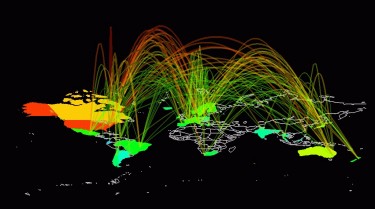Citizen media activists, digital rights advocates, and tech policy experts from Thailand to Colombia to Kenya have been buzzing in recent weeks about the complex issue of global Internet governance. Wonky and technical as it sounds, good governance—the making of global standards for Internet functionality and policy—is central to maintaining openness and technical efficiency on the global Internet.
Why all the noise now? At this December’s conference of the International Telecommunication Union (ITU), a UN sub-agency, member states will decide whether the ITU should expand its regulatory authority to areas of Internet governance.

David Westerfield. Labeled for reuse.
Background: Historically, the ITU has been dedicated to setting technical standards for interoperability of international telecommunications, radio, and satellite systems, in addition to promoting access to ICTs. But some member states have proposed expanding the ITU treaty to cover Internet-policy matters—leaked treaty documents include proposals for global regulations that could place limitations on online privacy, free expression, access to information and ICT use around the world.
Threat to openness: Many voices in international civil society are concerned that ITU members’ lack of expertise on Internet issues and the agency’s closed, non-transparent decision-making process could make this a problematic shift for the global Internet. Advocates are taking action around the conference by analyzing leaked proposals, participating in national-level public consultations on the issue, or commenting in online fora.

Internet traffic map by Joana Breidenback CC-BY
Get involved: Two recent initiatives allow civil society groups and individuals to publicly support a global Internet governance agenda that prioritizes openness and technical efficiency.
A coalition of digital rights groups (Access, CDT, Fight for the Future, Free Press, and OpenMedia) has launched a petition-style “unity statement” open for sign-on by any person or civil society (non-profit, non-government) organization. The platform also gives users a range of ways to continue learning about and advocating on the issue. Read the statement and sign on here.
Digital rights advocates and Internet governance experts from around the world met in Azerbaijan last week, just prior to the global, UN-sponsored Internet Governance Forum, to discuss coordination and advocacy strategies for improving Internet policy at an international level. At the meeting, entitled “Best Bits,” the group drafted a statement that highlights the lack of openness and transparency in the ITU process and the negative human rights implications of proposed changes to the treaty. Any group or individual can endorse the statement here.
Every voices counts: The ITU is made up of 193 member states – nearly every country on earth is represented there, and all members must make decisions by consensus. Every state has equal footing in this process – this means that citizens in any country can have an influence on the process by participating in public consultations, signing petitions, or contacting government officials to voice their concerns. The Internet Society has a crowdsourced resource page where anyone can go to learn what is happening in their country and how to get involved.
Readers can learn more about the ITU conference by visiting resource pages created by the Center for Democracy & Technology, Access Now, and the Internet Society.




27 comments